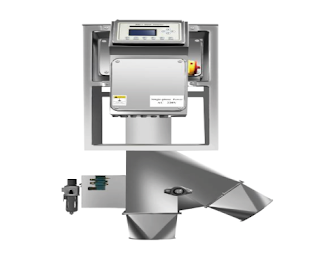Prevent Food Contamination with Metal Detectors
It’s a fact that food safety is a crucial concern
for producers as well as consumers. You may think that all your food products are
clean, but even a tiny amount of particulate or metal traces can easily
contaminate the product, which can be hazardous to health. Besides, that can
also greatly affect your brand reputation. But fortunately, such issues can be
avoided by using innovative food processing metal detectors. These devices can
detect the presence of metal before the packaging processes, ensuring proper
food safety. Let’s have a look at some reasons to use a metal detector or an x
ray for food inspection in a food manufacturing business.
Reasons To Use a Metal Detector
·
Identifying small metal particles that are shed due
to the daily usage of the food processing equipment can only be done through a metal
detector. Manual quality assurance checks may not be able to detect such small
debris or fragments. You can also integrate the metal detector with your flow
wrap machine and other packaging machines to reduce the presence of hazardous
metal contaminants.
·
High levels of metal contamination may also indicate
some issues with the production tools and equipment. Metal detectors can help
food producers arrange preventative maintenance or servicing for such tools
before they break down, leading to massive downtime.
·
Another major reason to use food processing metal
detectors is to remain compliant with the required
regulations and laws. Contamination may lead to serious legal issues and, in
some cases, even recalling your product.
·
Accurate metal detection can help you save more time
in your quality-check process. Such machines can lower the need for time-consuming
manual quality checks, allowing your workers to spend more time on other
important tasks.
Some Common Contaminants A Food Metal Detector Can
Detect
Thanks to the rapid advancement in food metal
detection technology, modern metal detectors can now easily detect even the smallest
quantities of metal. They work by utilizing the conductivity and magnetic
permeability of different metal particulates. Here are some common metal types
these machines can detect:
·
Ferrous Metals
These metals contain a higher level of iron. The
magnetic properties of these metals make them easily detectable through a metal
detector.
·
Non-Ferrous Metals
Despite
being non-magnetic, non-ferrous metals are highly conductive. Their
electromagnetic properties make it easier to detect these metals.
·
Stainless Steel
Stainless
steel doesn’t have any iron traces. Moreover, it is less conductive compared to
other metals, making it challenging to detect. Besides, various environmental
conditions, like high salinity and moisture, can make detection more difficult.
But by using modern food metal detectors, you can easily detect the presence of
stainless steel in food products.
Final Words
Now that you know how a metal detector or x-ray for food inspection can help in
improving food safety and quality, your next step should be finding the best
machine to get the task done. However, when buying, make sure that the machine
meets the required industry standard and can be integrated with your existing
systems, like the flow wrap machine. So, ascertain
your requirement and get in touch with a trusted and certified manufacturer to
buy the best metal detector now!




Comments
Post a Comment